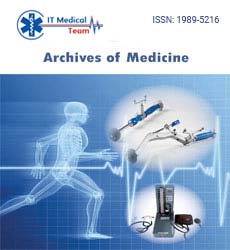Brief Report - (2022) Volume 14, Issue 1
Colorectal Carcinoma: A General Overview
Zeytun Dogan*
Department of Internal Medicine, University of Health Sciences, Antalya, Turkey
*Correspondence:
Zeytun Dogan, Department of Internal Medicine, University of Health Sciences, Antalya,
Turkey,
Email:
Received: 28-Dec-2021, Manuscript No. ipaom-21-12424;
Editor assigned: 05-Jan-2022, Pre QC No. P-12424;
Reviewed: 17-Jan-2022, QC No. Q-12424;
Revised: 22-Jan-2022, Manuscript No. R-12424;
Published:
31-Jan-2022
Summary
Critical interventions, such as early defibrillation, successful chest
compressions, and advanced life support, all play a role in the
outcome of cardiac arrest and cardiopulmonary resuscitation. In
published studies of cardiac arrest, Utstein-style terminology and
reporting templates have been widely employed, resulting in a
better knowledge of the parts of resuscitation practise and progress
toward international consensus on science and resuscitation
recommendations. International registers have yet to be formed,
despite the introduction of Utstein templates to standardise
research reporting of cardiac arrest.
Introduction
Colorectal Cancer (CRC) is the third most frequent malignancy and the fourth leading cause of death from cancer. The majority of CRC instances are found in Western countries, and the disease's prevalence is increasing year by year. Colorectal cancer is estimated to affect 4%-5% of people, and the chance of having the disease is linked to personal characteristics or habits such as age, chronic disease history, and lifestyle. The gut microbiota plays an important part in this, and dysbiosis can lead to colonic carcinogenesis via a chronic inflammatory mechanism. Fusobacterium spp., Bacteroides fragilis, and enteropathogenic Escherichia coli are among the bacteria that cause this multiphase process. Mutations in oncogenes, tumour suppressor genes, and genes involved in DNA repair pathways cause Colorectal Cancer (CRC).
Colon cancer is cancer that starts in the colon, while rectal cancer is cancer that starts in the rectum. Colorectal cancer refers to cancers that affect one or both of these organs. The majority of colorectal malignancies develop over time from adenomatous (precancerous) polyps, though this is not true in every case. After a series of mutations (abnormalities) in their cellular DNA, polyps (growths) might change. A family history of colon or rectal cancer, diet, alcohol consumption, smoking, and inflammatory bowel disease are all risk factors for colorectal cancer.
Colorectal carcinomas are classed as sporadic (70%), inherited (5%), or familial (1%), depending on the origin of the mutation (25 percent). There are three sorts of pathogenic processes that lead to this situation: Chromosomal Instability (CIN), Microsatellite Instability (MSI), and CpG Island Methylator Phenotype (CIMP). Common mutations, chromosomal changes, and translocations have been reported to affect important pathways (WNT, MAPK/PI3K, TGF-, TP53), and mutations; in particular, genes like c-MYC, KRAS, BRAF, PIK3CA, PTEN, SMAD2, and SMAD4 can be used as predictive markers for patient outcome in these types of CRC. Changes in ncRNAs, such as lncRNA or miRNA, can also contribute to different stages of the carcinogenesis process and have predictive value when utilised as biomarkers, in addition to gene mutations.
What causes colorectal cancer and how does it progress?
To maintain the body healthy and working properly, all of the body's cells normally develop, divide, and die. This process can sometimes spiral out of hand. Even though cells are meant to die, they continue to grow and divide. Colorectal cancer can occur when the cells lining the colon and rectum proliferate uncontrollably.
Most colorectal malignancies start out as tiny precancerous polyps (adenomatous or serrated). These polyps often grow slowly and do not produce symptoms until they reach a considerable size or become malignant. This allows for diagnosis and excision of pre-cancerous polyps before they develop into malignant tumours.
Unfortunately, certain colorectal tumours may go undetected for long periods of time. Regular colorectal screenings (examinations) are critical for detecting issues early. A colonoscopy is the greatest screening test. Faecal occult blood tests, faecal DNA tests, flexible sigmoidoscopy, barium enema, and CT colonography are some of the other screening methods (virtual colonoscopy). The age at which such testing begins is determined by your risk factors, particularly if you have a family history of colon and rectal cancers [1-5].
What is the procedure for detecting colorectal cancer?
A variety of tests can be used to diagnose colorectal cancer. This illness can be detected if you exhibit symptoms or if your caregiver notices something abnormal during a screening test. Your doctor may do the following tests as part of the diagnosing process:
• Tests on the blood
• Tests of imaging
• Biopsy
• Colonoscopy for diagnosis
• Proctoscopy
Conflicts of Interest
The authors declare no competing interests.
All authors declare that the material has not been
published elsewhere, or has not been submitted to another
publisher.
Data Availability
Authors declare that all related data are available
concerning researchers by the corresponding author's
email.
Acknowledgments
The authors wish to thank the nurses involved in the
pilot project for their input and feedback. The authors wish
to acknowledge the efforts of Dr. W. Stockman (1966-
2019) as the initiator of this project in AZ Delta.
REFERENCES
- Tiwari SJ, Mulmule R, Bijwe VN (2017) A clinical study of acute intestinal obstruction in adults-based on etiology, severity indicators and surgical outcome. Int J Res Med Sci 5: 3688-3696.
[Google Scholar], [Crossref]
- Tabrez MO, Chandak SR (2016) To study the clinical profile and management of acute small bowel obstruction at Acharya Vinobha Bhave Rural Hospital, Sawangi (Meghe), Wardha. Int J Sci Res 5: 1636-1639.
[Google Scholar], [Crossref]
- Wright HK, O'Brien JJ, Tilson MD (1971) Water absorption in experimental closed segment obstruction of the ileum in man. Am J Surg 121: 96-99.
[Google Scholar], [Crossref], [Indexed at]
- Cotlar AM (2002) Historical landmarks in operations on the colon—Surgeons courageous. Current Surgery. 59: 91-95.
[Google Scholar], [Crossref]
- Souvik A, Hossein MZ, Amitabha D, Nilanjan M, Udipta R (2010) Etiology and outcome of acute intestinal obstruction: A review of 367 patients in Eastern India. Saudi J Gastroenterol 16: 285.
[Google Scholar], [Crossref]
Citation: Dogan Z (2022) Colorectal Carcinoma: A General Overview. Arch Med Vol. 14 No.1:5






